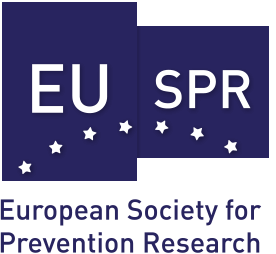Pre-conference workshops were convened with our SPAN partners on the 15th October. Workshops ran simultaneously from 0930-1530.
The two workshops were:
1. Optimising behavioural interventions – The MOST model and understanding effective prevention programme components – Prof Linda Collins, Penn State University (USA), and Prof Fabrizio Faggiano, Avogadro University (IT)
2. Economic analysis and the cost effectiveness of prevention – Introduction to Economic Evaluation of Health Care Interventions – Dr Claire McKenna and Ms Rita Faria, Centre for Health Economics, University of York, (UK)
An overview of the workshops can be found below.
As part of SPAN’s aim to establish stronger links to professional networks, they offered between 10 – 15 bursaries of up to €500 to young prevention scientists (PhD Students, Post docs) to assist in travel and accommodation costs associated with EUSPR/SPAN workshop attendance. Please note that applications for bursaries are now closed.
1. Optimising behavioural interventions – the MOST model and understanding effective prevention programme components – Prof Linda Collins, Penn State University (USA), and Prof Fabrizio Faggiano, Avogadro University (IT)
The multiphase optimization strategy (MOST) is a comprehensive, principled, engineering-inspired framework for optimising and evaluating multicomponent behavioural interventions. MOST includes a randomised, controlled trial (RCT) for intervention evaluation, but unlike the standard approach to intervention development, also includes other steps before the RCT. These steps are aimed at intervention optimisation using criteria selected by the scientist. The goal may be to develop a cost-effective intervention, an intervention that achieves a specified level of effectiveness, the briefest intervention that achieves a minimum level of effectiveness, or any other reasonable goal. The MOST framework relies heavily on resource management by strategic use of highly efficient experimental designs. MOST is designed to be practical, and holds out the possibility of achieving more rapid long-run improvement of interventions without a dramatic increase in intervention research resources.
The workshop is aimed at anyone who is interested in the development and evaluation of a broad variety of behavioural interventions. The day will begin with an overview of research undertaken by Prof Faggiano which has highlighted the challenges inherent in trying to understand the efficacy of prevention programme components. The session will then introduce the rationale and motivation for MOST, the framework and phases of MOST, and how a researcher would conduct a study using MOST. The workshop explores the design of screening experiments and includes plenty of opportunities for open discussion to understand how MOST might be applied to areas of interest to workshop attendees. At the end of the workshop attendees will be able to decide whether MOST would be helpful in their own research.
See the Penn State University website for further details on the Multiphase Optimization Strategy (MOST): https://methodology.psu.edu/ra/most
Please follow the link for the Workshop 1 timetable:
2. Economic analysis and the cost effectiveness of prevention – Introduction to Economic Evaluation of Health Care Interventions – Dr Claire McKenna and Ms Rita Faria, Centre for Health Economics, University of York, (UK)
Economic evaluation offers an explicit and transparent framework for the comparison of costs and health benefits of different interventions in order to help inform decisions on which interventions represent the best use of resources. An economic evaluation involves identifying the different interventions available to address the decision problem, measuring and valuing the costs and health benefits, and exploring the impact of uncertain parameters on the results.
This workshop introduces the different forms of economic evaluation (e.g. cost-minimisation analysis, cost-effectiveness analysis, cost-utility analysis, cost-benefit analysis), the methods used to conduct an economic evaluation, and how to critically appraise published studies in the context of decision-making. It starts with an overview of the basic economic concepts underpinning economic evaluation in health care, namely opportunity cost, efficiency and equity. This is followed by a step-by-step guide on how to conduct an economic evaluation using a ten-point checklist as a template for study design and critical appraisal. It includes: (i) definition of the economic question, (ii) perspective of the evaluation, (iii) identification, measurement and valuation of the costs and health outcomes, (iv) analytic methods of cost-effectiveness analysis, (v) dealing with uncertainty, and (vi) interpretation of the results. The workshop finishes with a case study for group discussion. The case study will demonstrate how to apply economic evaluation in practice and how to use the results for making decisions. This workshop is of interest to prevention professionals wishing to understand economic evaluation and the application of methods to preventative care.
Centre for Health Economics, University of York website
Please follow the link for the Workshop 2 timetable:
Workshop 2 convener biographies:
Please follow the link for the Workshop 2 convener biographies:
